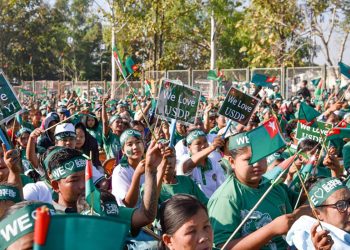MYITKYINA, Kachin State — Thousands of ethnic Kachin people gathered to hear Gen. Gun Maw, deputy chief of the Kachin Independence Army (KIA), speak in Myitkyina on Thursday morning, on the heels of the latest peace talks between the Kachin armed group and the government.
Speaking mostly in Kachin language and sometimes in Burmese, Gun Maw urged his audience to support efforts to end the long-running conflict in northern Burma, which has displaced more than 120,000 civilians over the past three years.
“I want to ask our people to closely watch and support the current political movement, and please be optimistic about the movement, and support us,” the Kachin army leader said.
He said ethnic leaders from the KIA and other armed groups were continuing to push for a federal political system, whereby ethnic minority states would receive greater political power and control over their natural resources.
“No one can say the Panglong agreement is illegal,” he said, referring to a deal reached in 1947 to bring ethnic minorities into the soon-to-be independent Union of Burma.
Under the agreement, the government—represented by independence hero Gen. Aung San—granted ethnic minorities a considerable degree of political autonomy. However, the deal was never fully implemented, and after a coup in 1962 the military scrapped it completely.
“Gen. Aung San represented the Burmese and signed this agreement for a federal system with our Kachin, Chin and Shan,” Gun Maw said, referring to two other ethnic groups which were present during the 1947 signing. He added that the Kachin armed leaders today were not seeking to secede from the country.
Many in the crowd on Thursday morning wore traditional Kachin dress, while others wore KIA T-shirts. Some waved the rebel army’s flag. One elderly observer held up a photo of Gun Maw on a sign that read, “This is our leader.”
The Nationwide Ceasefire Coordination Team (NCCT)—a coalition of 16 ethnic armed groups, including the KIA, that is negotiating with the government over a nationwide ceasefire accord—was also represented at the three-hour gathering in Kachin National Manau Park.
NCCT chief Nai Hong Sar echoed calls for a federal system that would grant equal rights to people around the country. “The federal [model] would be like a village where everyone has their own house. Everyone speak their own language and run their own family in their home. Everyone can choose their own religion,” he told the crowd.
He said an armed struggle was necessary after Burma’s independence, to push for self-determination. “We ran a revolution, but this does not mean we love violence. We did it because the central government used armed force and repressive measures against our ethnic people when we asked to share power,” he said.
Many in the crowd clapped their hands in support when he added that the current political situation also warranted an armed struggle. Otherwise, the NCCT leader said, the central government would never respect ethnic leaders’ demands for political dialogue.
Nai Hong Sar accused the Burma Army of dominating recent peace negotiations. “We found that during our last meeting in Rangoon, only the army representatives spoke. The rest of the people from the government dared not speak. The army has much influence in the country,” he said.
Ko Than Khe, a leader of the All Burma Students’ Democratic Front (ABSDF), another armed group, told the crowd that the government spoke of peace but still did not see eye to eye with opposition leaders.
“They use similar words such as democracy, peace and federalism, but these have a different meaning than we assume. Please support our effort,” Ko Than Khe urged the Kachin people. “Our country has a culture of discussion and negotiation now.”
The speeches on Thursday followed the latest bilateral peace talks between the KIA and government peace negotiators in Myitkyina, the Kachin State capital.
During the talks, both sides agreed to set up a peace monitoring commission to observe troop movements on both sides and establish who is responsible for future clashes.
Fighting has intensified in Kachin and northern Shan states since early April, leaving at least 22 government and rebel soldiers dead, while displacing over 2,000 civilians from their homes.

















